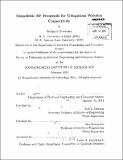Monolithic RF frontends for ubiquitous wireless connectivity
Author(s)
Goswami, Sushmit
DownloadFull printable version (17.71Mb)
Alternative title
Monolithic radio frequency frontends for ubiquitous wireless connectivity
Other Contributors
Massachusetts Institute of Technology. Department of Electrical Engineering and Computer Science.
Advisor
Joel L. Dawson and Hae-Seung Lee.
Terms of use
Metadata
Show full item recordAbstract
The desire for ubiquitous connectivity is pushing radios towards highly-integrated, multi-standard and multi-band implementations. This thesis explores architectures for next-generation RF frontends, which form the interface between the RF transceiver and antenna. RF frontend performance has important implications for the energy efficiency, frequency range and sensitivity of the radio. Ubiquitous connectivity requires bringing online previously unconnected, closed-circuit systems. Case in point, the recently ratified 802.11p standard targets wireless access in vehicular environments. The first part of this thesis presents an RF frontend for 802.11p applications. Gallium Nitride is used as an enabling technology platform for monolithic integration of high-power RF functions. A number of architectural techniques are proposed to enhance energy efficiency. Even in relatively mature use cases like smartphones, significant evolution is needed to address future needs. Emerging wireless standards specify dozens of bands covering several octaves for worldwide connectivity, which need to be supported with a single device. However, in current multi-band radio implementations, significant redundancy is still the norm in the RF frontend. In the second part of this thesis, an improved architecture for multi-band, time-division duplexed radios is introduced, which replaces multiple narrowband frontends with a frequency-agile solution, tunable over a wide frequency range. A highly digital architecture is adopted, leading to a fully integrated solution wherein both efficiency and achievable frequency range benefit from CMOS scaling.
Description
Thesis: Ph. D., Massachusetts Institute of Technology, Department of Electrical Engineering and Computer Science, 2014. Cataloged from PDF version of thesis. Includes bibliographical references (pages 137-144).
Date issued
2014Department
Massachusetts Institute of Technology. Department of Electrical Engineering and Computer SciencePublisher
Massachusetts Institute of Technology
Keywords
Electrical Engineering and Computer Science.